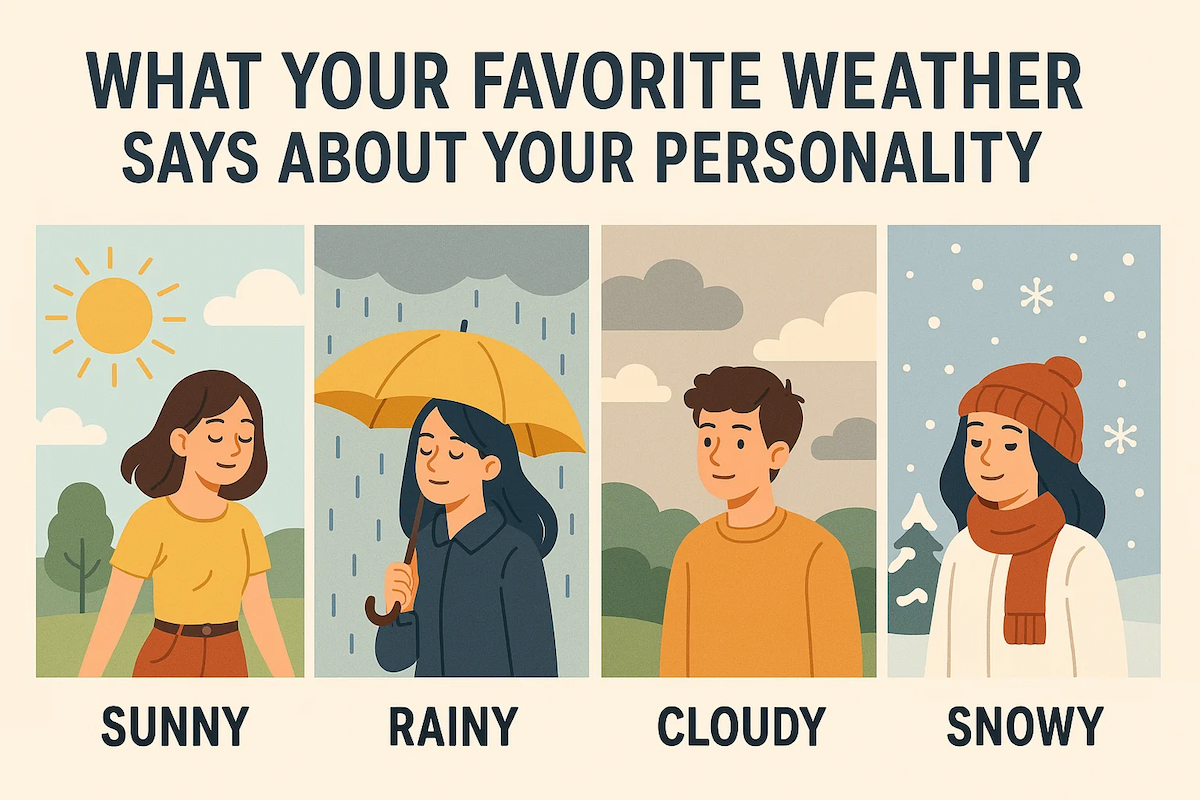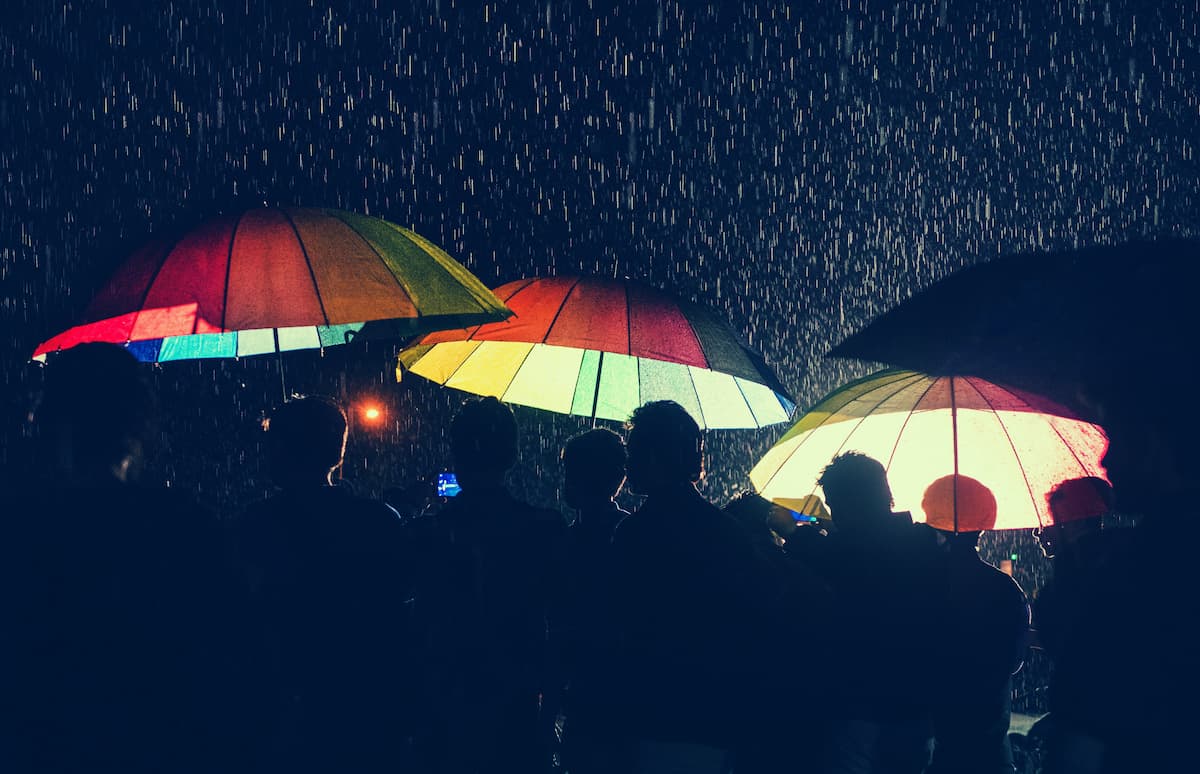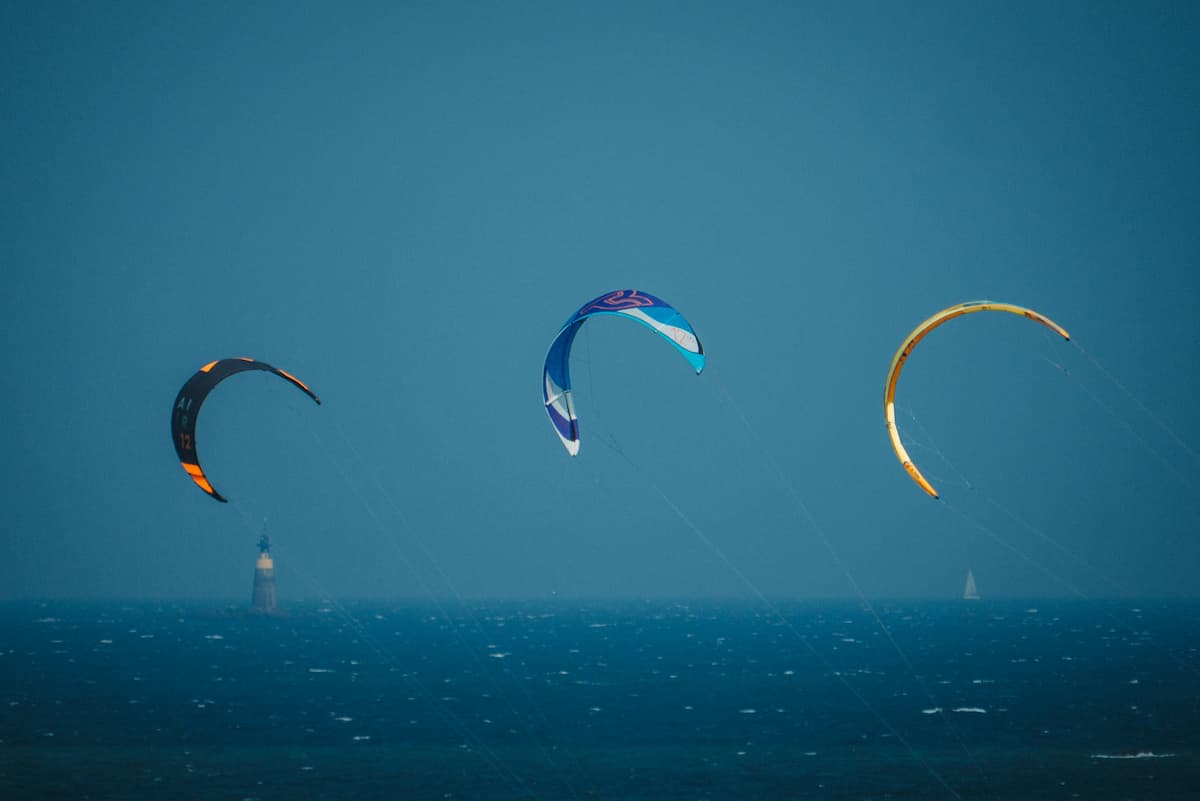
Watch short for this article (5 slides)
What Your Favorite Weather Says About Your Personality
Does the crisp, electric air before a thunderstorm make you feel inexplicably alive? Or perhaps the gentle, persistent patter of rain on the roof soothes your soul like nothing else? Many of us feel a distinct connection to certain types of weather, a preference that goes beyond mere comfort. While the idea that your favorite weather definitively dictates your personality belongs more to playful self-reflection than hard science, exploring these connections can offer fascinating insights into our temperaments, emotional landscapes, and perhaps even our deeper psychological leanings. This article delves beyond superficial descriptions, exploring the potential "why" behind these preferences, incorporating nuances, and considering the sensory and psychological dimensions of our relationship with the elements.

Sunshine Seekers: Embracing Warmth, Light, and Energy
A preference for consistently sunny and warm weather – think clear blue skies, temperatures comfortably ranging from 20-28°C (68-82°F), and abundant daylight – is often linked to classic optimistic and extroverted tendencies. But let's dig deeper. 
Photo by Lindsey Franzke on Unsplash
- Biological Resonance: Sunlight triggers the release of serotonin, a neurotransmitter associated with mood elevation and feelings of well-being. It also regulates our circadian rhythms, promoting wakefulness and activity. A preference for sun might reflect a body and mind that thrive on this natural energy boost. Learn more about sunlight and serotonin.
- Behavioral Alignment: Sunny weather typically facilitates outdoor activities, social gatherings, and exploration. Those who prioritize social interaction, physical activity, and a generally outward-facing life may naturally gravitate towards weather that supports this lifestyle.
- Psychological Associations: Culturally, sunshine is heavily associated with positivity, growth, happiness, and clarity ("a sunny disposition"). Individuals who value these qualities or strive to embody them might find sunny weather particularly resonant. This preference could indicate a desire for predictability and a generally positive outlook, potentially finding gloomier weather patterns demotivating or restrictive.
- Sensory Experience: The physical sensation of warmth on the skin, the brightness reducing shadows, the vibrant colours – these sensory inputs can be inherently uplifting for some.
Nuance: This doesn't mean sun-lovers are immune to challenges, but they might possess a stronger innate belief in overcoming them, seeking out the "light" both literally and figuratively.
Rain Romantics: Finding Comfort in Coziness and Contemplation
Loving rainy days often means embracing a specific atmosphere – perhaps the gentle, steady drizzle perfect for staying indoors, or the rhythmic drumming of a heavier downpour creating a sense of enclosure. This preference often correlates with introspection, creativity, and an appreciation for quiet.
Photo by Divya Agrawal on Unsplash
- Sensory Sanctuary: The sound of rain (a form of 'pink noise') can have a calming, masking effect on other more jarring environmental sounds, aiding focus and relaxation. The smell of petrichor – the earthy scent produced when rain falls on dry soil – is often found pleasant and grounding.
- Prospect-Refuge Theory Connection: Some environmental psychologists suggest we're drawn to environments where we can observe ('prospect') from a place of safety ('refuge'). A rainy day enjoyed from indoors perfectly embodies this – watching the weather unfold from a secure, cozy space.
- Permission for Solitude: Rainy weather often curtails outdoor plans, providing a socially acceptable reason to slow down, stay home, and engage in solitary activities like reading, writing, or deep thinking without feeling the pressure to be 'out doing something'.
- Emotional Resonance: For some, the muted light and introspective mood of a rainy day align with a more complex emotional landscape, offering a sense of validation or comfort for feelings of melancholy or thoughtfulness. It can feel like the weather mirrors a more nuanced inner state.
Nuance: It's not about sadness, but often about finding beauty in melancholy, appreciating subtlety, and valuing inner exploration over constant external stimulation. The type of rain matters – a gentle shower versus a destructive flood evokes different feelings.
Snowfall Admirers: Nostalgia, Stillness, and Transformation
The magic of snow – particularly the first significant snowfall or a landscape blanketed in fresh powder – often appeals to those with a strong sense of nostalgia, an appreciation for aesthetic beauty, and perhaps a playful spirit.

Photo by Ali Kazal on Unsplash
- Aesthetic Transformation: Snow dramatically alters the landscape, simplifying complex scenes, muffling sound, and creating a visually 'clean' and often beautiful environment. This appeals to those who appreciate visual harmony and tranquility.
- Sensory Shift: The profound quiet that often accompanies heavy snowfall can be deeply calming. The crisp, cold air invigorates the senses in a unique way.
- Nostalgic Triggers: For many, snow is strongly linked to childhood memories – holidays, playing outdoors, school closures. This deep-seated nostalgia contributes significantly to the positive feelings associated with snow.
- Symbolism of Renewal: A blanket of fresh snow can symbolize a fresh start, purity, or a temporary escape from the 'messiness' of everyday life. This resonates with those who appreciate moments of reset or reflection.
Nuance: The appeal might diminish with the practical difficulties snow brings (travel disruption, dangerous conditions). The love is often for the idealized snowfall – beautiful, gentle, and temporary – rather than a prolonged, harsh winter.
Wind Chasers: Embracing Energy, Change, and Freedom
Finding exhilaration in a windy day – whether a brisk, refreshing breeze or the powerful gusts of an approaching storm – often suggests a personality drawn to energy, change, and perhaps a touch of wildness.

Photo by Matt Seymour on Unsplash
- Sensory Stimulation: The physical feeling of wind on the skin, the sound of it moving through trees or structures, and the visible impact on the environment (swaying branches, flying leaves) provide strong sensory input that some find invigorating.
- Metaphor for Change: Wind represents movement, change, and unseen forces. Those who are adaptable, dislike stagnation, and embrace spontaneity might find windy weather reflects their inner drive.
- Feeling of Power/Freedom: Experiencing strong winds can evoke feelings of being connected to powerful natural forces, which can be thrilling or feel liberating for certain individuals. It speaks to a desire to feel 'alive' and energized.
- Sensation Seeking: A preference for strong winds might align with higher levels of sensation-seeking – a personality trait characterized by the search for varied, novel, complex, and intense sensations and experiences.
Nuance: There's a difference between an invigorating coastal breeze and a destructive gale. The preference is typically for winds that feel energizing rather than threatening.
Overcast Appreciators: Seeking Calm, Focus, and Consistency
While often perceived as gloomy, overcast or cloudy days hold a unique appeal for those who value calmness, consistency, and a focused atmosphere. This isn't about negativity, but rather finding peace in subtlety.
- Reduced Sensory Input: The diffused, even light of an overcast day reduces glare and visual distraction, which can be conducive to concentration and mental focus for some individuals.
- Emotional Equilibrium: The lack of intense brightness or dramatic weather shifts can feel calming and grounding. It provides a neutral backdrop that allows for internal equilibrium without strong external emotional cues.
- Predictability and Stability: Unlike the potential intensity of sun or storms, overcast weather often feels stable and predictable, which can be comforting for those who prefer consistency and dislike abrupt changes.
- Subtle Beauty: Appreciating overcast days often involves finding beauty in muted colors, soft light, and subtle variations in the clouds – an appreciation for nuance over overt displays.
Nuance: This preference is distinct from Seasonal Affective Disorder (SAD), where lack of sunlight leads to depression. Overcast appreciators find genuine comfort or focus in these conditions, not distress. See info on SAD from the National Institute of Mental Health.
Storm Enthusiasts: Drawn to Intensity, Drama, and Release
Being captivated by thunderstorms – the rumble of thunder, the flash of lightning, the intensity of rain and wind – suggests a personality that embraces intensity, drama, and powerful emotional experiences.

Photo by Duncan Sanchez on Unsplash
- Awe and the Sublime: Thunderstorms are potent displays of nature's power, capable of invoking feelings of awe – a mix of wonder, respect, and even a little fear. This connection to the sublime can be deeply compelling.
- Sensory Spectacle: The combination of sound, light, and intense weather provides a full-sensory experience that is dramatic and captivating for those who thrive on high stimulation.
- Emotional Catharsis: The intensity of a storm can mirror or provide a release for strong internal emotions. The energy in the atmosphere can feel validating or even cleansing to individuals who experience emotions intensely.
- Appreciation for Contrast: The contrast between the storm's fury and the calm that often follows can be particularly satisfying, highlighting cycles of tension and release that might resonate with certain personalities.
Nuance: Safety is key; the appreciation is typically for experiencing the storm from a secure location. It reflects an embrace of life's intensities, not necessarily recklessness.
Beyond Simple Labels: Understanding the Nuances and Science
It's crucial to remember that these connections are largely associative and reflective, not scientifically deterministic personality profiles. Human psychology is complex, and our relationship with weather is influenced by many factors:
- Personal Experiences: Positive or negative memories associated with certain weather types heavily influence our preferences.
- Cultural Background: Different cultures have varying symbolic meanings and associations with weather phenomena.
- Current Mood & Needs: You might crave a cozy rainy day when feeling tired and needing rest, but prefer sunshine when feeling energetic and sociable.
- Physiological Realities: While preference is subjective, weather does have measurable physiological and psychological effects. Lack of sunlight can contribute to SAD in susceptible individuals, while extreme heat or cold impacts physical comfort and safety. These are distinct from simply preferring one type of weather over another.
Think of these "weather personalities" as starting points for self-reflection rather than rigid categories. They offer a lens through which to consider your own responses to the natural world and what those responses might suggest about your inner landscape.
What's Your Weather Story?
So, which weather resonates most deeply with you? Do the descriptions above spark recognition, or does your connection feel different? Consider not just what weather you prefer, but why. What specific sensations, memories, or feelings does it evoke? Understanding this personal weather story can be a delightful way to connect with both the environment and yourself.
Share your favorite weather and your thoughts on why you love it in the comments below or join the conversation on social media. Let's explore the rich tapestry of human experience as reflected in our elemental preferences!
